“Learn something from Tanya”. “She is such a good girl and does not throw any tantrums.” “Amayra is so cute and you are so naughty. Why cannot you become like her?” “Look at the marks Malini Aunty’s son has got. Had you worked harder you could have got better grades.”. “Amar is good in sports and academics, and just look at yourself”. Are these statements not sounding familiar? I am sure unknowingly these statements have been used by most of us for our children. Though your intention was not to hurt your child, but the damage is done and it usually is irreversible and by the time you realise, it is too late. Understanding your kids’ psychology is one of the positive parenting tips for child development. You can read some easy positive parenting tips and follow them in your routine.
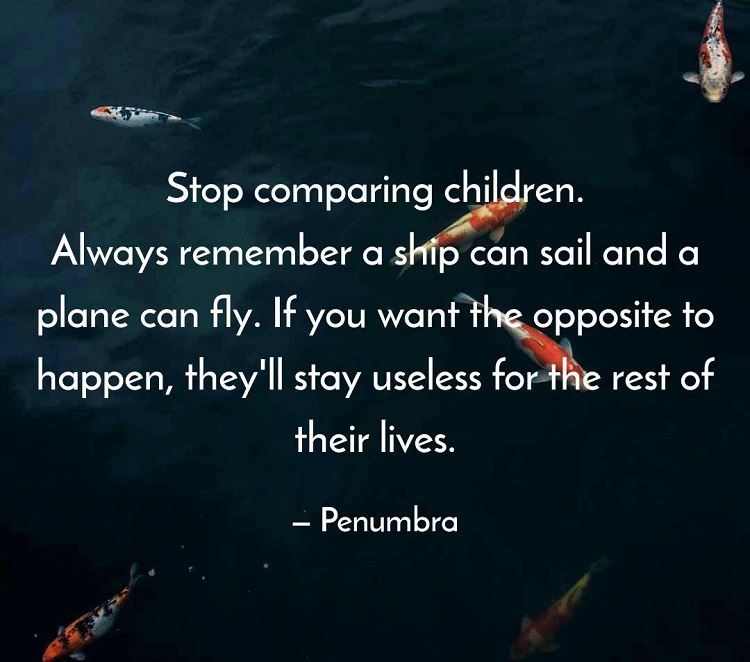
I read somewhere, “The fastest way to kill something special is to compare it to something else”. The statement is so true, but if we think about it, we all do not implement it. While we compare everyone around us, it is a predominant practice in our homes to compare our children to improve their performance. Grandparents and parents, and for that matter extended family also think this is the ideal way to encourage the child to perform better, but not many realize that doing this is detrimental to the child growth and development, and in no way, they are contributing to their growth.
Little Miss A was a preemie as many know, thus, she achieved her milestones at a different rate. I never stressed on when she will walk or talk or eat or potty train. When she did not do something at the age she was expected to do it, many people questioned and wanted me to push her. I always helped her try but as her doctor was always happy with her growth, I never gave in to the society pressures. What was the hurry? Thankfully, she was small, or rather is still small to understand the comparisons; but the day she starts realising, this competition can affect her growth and confidence. My little girl does not need to be like anyone, she just needs to try to be a better version of herself.
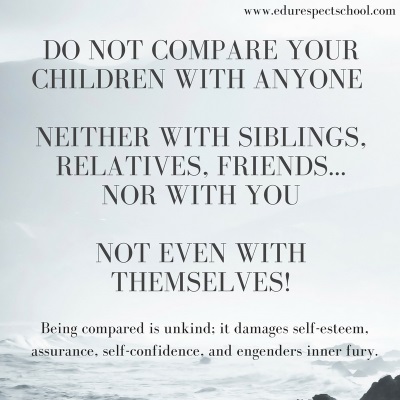
Table of Contents
Why We Need to Stop Comparing
I understand the psyche of parents when they compare their child to their cousins, friends or even siblings. Most of us think that comparison will make the child competitive and this will become their driving force to work harder and do well. It is essential for us to understand that like no two flowers are same, no two children are the same as well. A flower just blooms without bothering about the flower next to it. Children are the same. They work at their pace and have different fortes. When we compare them to their peers, this can lower their self-esteem and confidence levels; which is something none of us want as a parent. Let them make mistakes sometimes and learn from them.
You may like this: Why You Should Allow Your Kids to Make Mistakes?
Comparison has many negative effects on child psychology. Parents do not pay much attention to what they are saying to the child when comparing. Let us see how comparison can negatively affect your child.
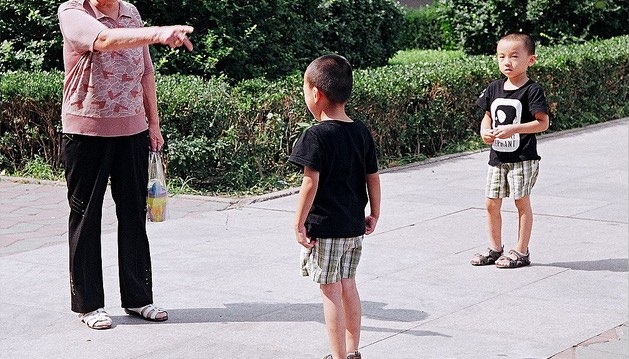
Makes Them Distant
The child understands how supportive the other person is. Any person who is constantly comparing them and judging their abilities, will be the person they will have no confidence in. The mere thought, that little Miss A might not be able to trust me and share her problems with me, is not acceptable to me. For raising children to do well, their problems need to be understood and handled well. A child will only share problems with the person they trust blindly and are confident will support them. If the child is scared of being judged, the chances of them sharing their issues are very less.
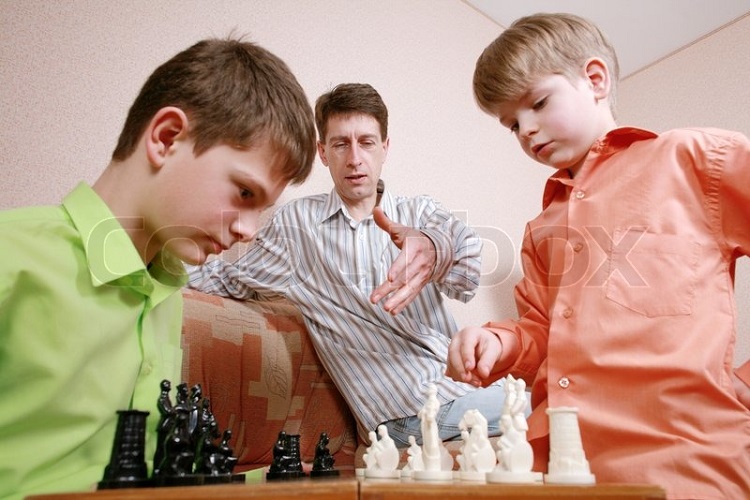
Lowers Their Self Esteem
When we compare the child to others, we are always focusing on their weaknesses and are forcing kids to work on them. In this rat race, we completely ignore their strengths which we all need to work on. If the focus is always on the negatives, it is natural for a child to lose his or her self-esteem. All parents must appreciate the fact that each child is different and has a different pace to learn. The education system is anyways a nuisance, and when we add pressure at home by comparison, the child will lose confidence. (Read the post, Never Force Your Kids for These 7 Things)
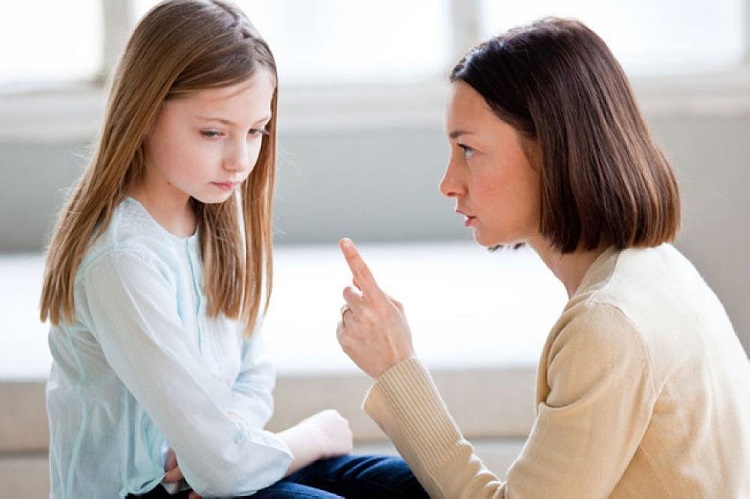
Social Awkwardness
Low self-worth and self-doubt start setting in when a child is constantly compared to others around him. This leads to a situation when a child is not able to express his feelings and many times not be able to talk freely about any issue he is facing. The fear of being judged is a big thing for kids, and thus, they do not make friends easily also. These problems can aggravate and can lead to behavioural disorders in children. Children need to be encouraged and any discouragement can break their confidence. It is best not to compare the child to ensure their proper personality and psychological development.
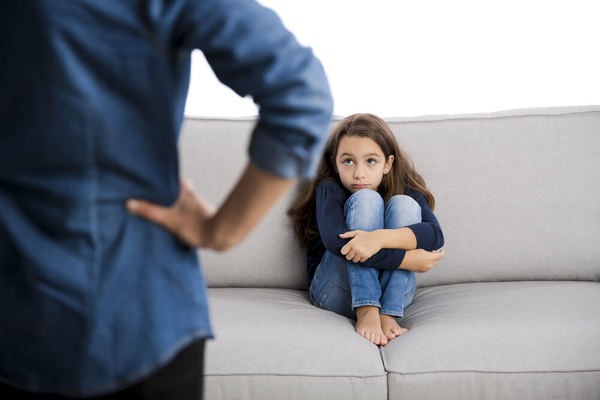
Nervousness
Comparing a child is putting too much pressure on them which can make them jittery and nervous. Some children, when compared, want to ensure that they are the best and this puts too much pressure on them. They do everything to please their parents or the others around them and meeting expectations becomes their sole purpose. They lose their confidence in this way and also their independence which creates problems in the long run.
Some children, after a point, stop trying to please people as they feel there is no point in trying. They adopt a carefree attitude as they know none of their accomplishments will be appreciated.
Negativity and Jealousy
Children when compared to others, become jealous and negative towards the other child and this leads to aggression and hatred too. In our endeavour to improve them, we spoil their relationship with kids around them. This becomes a bigger point of concern when the relationship in question is that with the sibling. These feelings do not go away easily and have a long-lasting impact on their relations in life.
As a parent, each one of us only want the best for our child. We compare them to help them grow, but if done beyond a point, can have serious repercussions. Rather than comparing somethings which we can do are:
- Do not compare with others but with their own performance.
- Always look at their strengths and appreciate them.
- Teach them to accept their weaknesses and cope with them.
- Set expectations but be realistic.
- Always love and support them. They should know you are proud of them for whatever they are.
There is no parenting rule book and I am sure, how we all wish they was one which would make us the ideal parent. None of us can be the perfect parents, and thus, it is inhuman to accept our kids to be perfect. We are their support systems and it is us they will look for when they need a shoulder to support. We have to give them a positive environment to bloom. As Jess Lair said, ‘Children are not things to be moulded, but people to be unfolded.’
You may like to read:

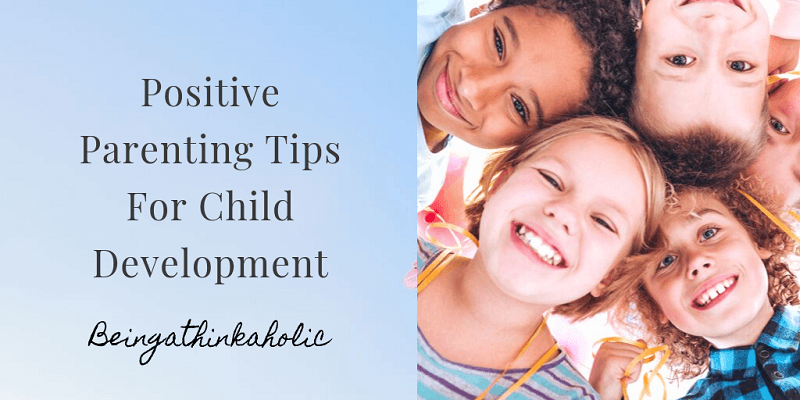



[…] You may also like: Why You Should Never Compare Your Children With Others? […]
[…] You may like to read our post, Why You Should Never Compare Your Children with Others […]
Those are the key factors that we often over look when we make comparisons in quest of doing everything right for them; unknowingly we instill low self esteem and other issues. Very apt and to be imbibed right!
Those are the key factors that we often over look when we make comparisons in quest of doing everything right for them; unknowingly we instill low self esteem and other issues. Very apt and to be imbibed right!
This is a well-written article and I totally agree we should compare kids and kill their spirit and joy of being. It can lead to problems as teens and beyond.
Again a great post Aarushi and you had shared great points regarding positive parenting. I agree comparing kids with other kids lower their self steam and confidence and as a parent we should try to keep them motivated instead of doing unnecessary comparison, #Alexanonstop
How To Teach Your Baby To Sleep On His Own
We, as mothers, absolutely love rocking and swaying our babies in our laps to make them sleep. We love the bonding and the closeness with our babies in the process. However, it’s also important to teach your baby to sleep independently and without any assistance. This will make your kids learn good sleeping habits and develop a sound sleep pattern.
I started training my kids to sleep on their own as soon as I weaned them and moved them to bottle feeds. It took a little while but it was a massive relief when they finally began to sleep on their own. I could finally have a routine and could plan my day as per my babies’ schedule. I am sharing my experience and what I did for teaching my babies to soothe themselves to sleep.
https://www.prettymummasays.com/
These fun games for the Women’s Day celebration are sure to make the parties and get-togethers fun and memorable. International Women’s Day is celebrated on 8th March every year. It stands as the focal point in the women’s rights movement.
Every year 8 March is honoured as a day in memory of working women. The day has been celebrated as International Women’s Day or International Working Women’s Day ever since. After women gained suffrage in Soviet Russia in 1917, March 8 became a national holiday there. The day was then predominantly celebrated by the socialist movement and communist countries until it was adopted by the feminist movement in about 1967. The United Nations recognised and began celebrating the day in 1975.
https://www.prettymummasays.com/
[…] (You may like to read our post, Positive Parenting Tips for Child Development) […]
[…] In the bargain, there is a lot to lose. To know how comparison affects a child, read our post, Positive Parenting Tips for Child Development. The issue is we set high standards of parenting for ourselves and in order to meet those, we start […]
[…] child is different and you should never compare them. Read our post on Positive Parenting Tips to know […]
[…] In the bargain, there is a lot to lose. To know how comparison affects a child, read our post, Positive Parenting Tips for Child Development. The issue is we set high standards of parenting for ourselves and in order to meet those, we start […]
[…] 2. Positive Parenting Tips for Child Development […]